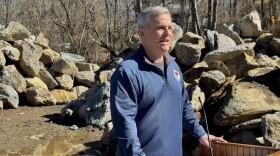North Carolina is home to 35 known species of fireflies. Experts say human disturbances can affect these bright insects, but there are things people can do to make them more at home in their yards this summer.
Fireflies have an important place in ecosystems, including those close to home. These insects are predators that feed on the snails and slugs that can be pests in gardens.
But populated areas can be inhospitable to fireflies because of light pollution.
Gareth Powell, a professor of Entomology and Plant Pathology at North Carolina State University, said light pollution can prevent fireflies from communicating and finding mates.

“I know a lot of people have lights on in the evening and throughout the night but try turning them off, or turning the ones that face, kind of your more natural areas off or down,” he said.
Fireflies actually spend most of their lives in the larval stage before they grow into the adult form that we think of as fireflies.
Powell said people can also make their yards and surrounding areas more hospitable by keeping trees up and leaving leaf litter undisturbed, which is where they live as larvae before they grow into adults.
“So, if you remove all of the wooded areas and remove all of the leaf litter, that's going to impact firefly populations a ton,” Powell said. “And then if you add light on top of that, it's going to continue to impact them.”







